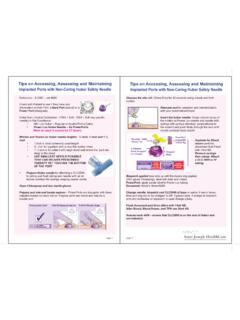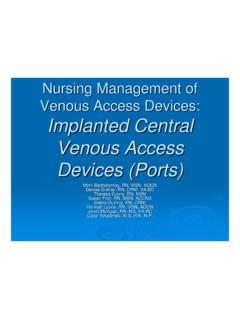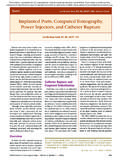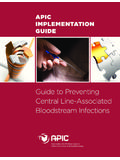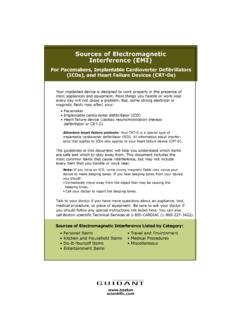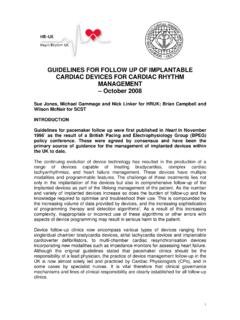Transcription of PACEMAKER AND ICD INTERROGATION ... - …
1 PACEMAKER AND ICD INTERROGATION To receive the maximum benefit from your PACEMAKER , you will need to have regular follow-up to ensure that it is working properly. This follow up can be arranged by you to be performed by your cardiologist, local hospital device clinic (if they have such a clinic), or your follow up can be through Leachman Cardiology Associates. PACEMAKER INTERROGATION The first device evaluation will occur about 4 months after implantation. A letter will be mailed to you to remind you to schedule this appointment. You will need to provide the staff with a list of your current medications, so please bring a copy with you to every visit. During your first office evaluation, the PACEMAKER representative or physician will perform a device evaluation called an " INTERROGATION ".
2 This device INTERROGATION will assess if the PACEMAKER lead wires going into the heart are functioning normally, that the battery level is okay, and will assess if there have been any abnormal heart rhythms detected by the PACEMAKER . The device representative or physician will review all the test results with you during your visit and answer any questions you have relating to your PACEMAKER . After this first PACEMAKER evaluation, subsequent intensive in-office PACEMAKER evaluations occur about every 6-12 months. ICD INTERROGATION A letter will be mailed to you from Leachman Cardiology Associates prompting you to call to schedule this appointment. You will need to provide the staff with a list of your current medications, so please bring a copy with you to every visit.
3 During your first office evaluation, a device representative or physician that is specially trained and certified in evaluating ICDs and pacemakers will perform a device evaluation called an " INTERROGATION ". This device INTERROGATION will assess if the ICD lead wires going into the heart are functioning normally, that the battery level is okay, and will assess if there have been any abnormal heart rhythms detected by the ICD. The device representative or physician will review all the test results with you during your visit and answer any questions you have relating to your ICD. If I Receive An ICD Shock - This is a scary experience and can be associated with discomfort, but feel reassured that this therapy is the most successful and safest method to promptly terminate dangerous heart rhythms.
4 Also, the shock does not cause damage to the heart muscle. The primary therapy of an ICD is to deliver a shock to excessively fast heart rhythms to convert the heart rhythm back to normal. If before and after the ICD shock you have little or no symptoms such as shortness of breath and/or chest pain, then you can contact the our office during office hours, Monday through Friday from 8:30AM- 5:00PM. In general, there is no need to go to an emergency room. However, if you receive 2 or more shocks within a week, we would like to hear from you immediately. If you receive repeated ICD shocks for one episode, then this requires emergency evaluation by calling 911 emergency services. If CPR and other lifesaving activities are needed, they should be started immediately.
5 Frequently Asked Questions About ICDs Q: If someone is touching me when I am shocked, will they too receive a shock? A: No. Q: How are the specific parameters for my ICD measured and changed? A: The ICD contains a computer chip that can be evaluated and reprogrammed in a painless manner. By using a hand-held device placed over your clothes, on top of the ICD, we can retrieve information about the ICD battery, leads as well as alter specific features for your ICD. Q: How long will my ICD device and leads last? A: A typical ICD battery life is 3-5 years. The ICD leads have a longevity of approximately 7-10 years. Both the battery life and the performance of the leads will be monitored through frequent evaluations by Leachman Cardiology Associates, or follow up can be coordinated with your local hospital or cardiologist.
6 Q: What happens when the ICD battery becomes low? A: When the ICD battery is measured low through routine follow up with Leachman Cardiology Associates, you will be notified and scheduled for replacement of the ICD generator. Replacement of the ICD generator is a simple outpatient procedure. The electrophysiologist will open the ICD skin pocket and unplug the leads. The leads will be tested to make sure they function properly. After testing, the leads are connected to the new ICD pulse generator, tested and the pocket is closed. The entire operation often takes less than an hour. Q: What should I do if I hear "beeping" from my ICD? A: If you hear an audible "beep" from your ICD, please contact the office, Monday - Friday 8:30AM - 5:00PM at 713-790-9401.
7 There are many defibrillators that emit a tone when there is a parameter that needs to be assessed. In general, this is not an emergency. Q: What should I do if I feel a thumping in my chest? A: Sometimes patients with a biventricular ICD can experience an unusual sensation of "thumping" on the left side of their chest, usually most pronounced if they are in a certain position such as when they roll onto their left side. This thumping may be due to the electrical impulse from the biventricular PACEMAKER causing stimulation of a nerve on the outside of the heart (called the phrenic nerve). This nerve travels to the diaphragm and can cause the diaphragm to beat, which creates these symptoms. Fortunately, this problem can be managed by reprogramming your ICD.
8 You should contact our office the next working day, Monday - Friday 8:30AM - 5:00PM at 713-790-9401, but this problem usually does not require a visit to your emergency room. Q: What should I do if I notice my ICD incision is red, swollen or that fluid is leaking from the incision site? A: If you have these symptoms or changes along your ICD incision, we believe that it is important for you to contact your local physician (if you are out of town) or Leachman Cardiology to evaluate the ICD. This may be a simple matter of minor blood collection within the ICD pocket or it may be an early sign of an infection. Q: What are the recommendations regarding driving with an ICD? A: After an ICD is implanted, many patients are correctly concerned about their ability to safely operate a motor vehicle.
9 Guidelines regarding when to return to driving are dependent upon why the device was implanted and whether the implanted device is a PACEMAKER or defibrillator. Q: When can I return to work? A: The decision when to return to work is based on the particular job and working environment as well as consideration of other heart issues. Please be certain that this issue is addressed by Leachman Cardiology Associates before your discharge, or feel free to contact us. We are very familiar with providing documentation and forms if there is a need to provide information to your employer. Q: Can an ICD prevent a heart attack? A: No, an ICD cannot prevent a heart attack, which is due to a blockage in the blood flow to the heart muscle.
10 Q: Does an ICD treat other heart rhythm abnormalities like atrial fibrillation? A: An ICD is designed to treat rapid heart rhythms from the bottom chamber of the heart as well as excessively slow heart rhythms that are treated with pacing therapies. However, an ICD does not treat rapid heart rhythm problems from the top chambers of the heart, such as atrial fibrillation. Q: What type of interactions may occur with my ICD and a microwave, cell phone, store security devices, airport security or arc welding? A: There is no interaction between a microwave and an ICD. We would prefer that you use a cell phone on the opposite side of your ICD but, in general, the likelihood of complications between an ICD and cell phone is quite low.






